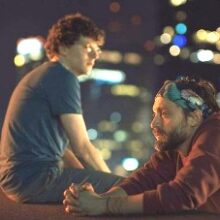 There’s a movie out called Jackie, with Natalie Portman playing Jackie Kennedy, and I kind of avoided it for awhile because I’m wary of films that dramatize the lives of famous people, biopics they’re usually called. In my experience they often fail to be insightful or interesting. But then I noticed that it’s directed by Pablo Lorrain, a Chilean whose two other films that I’ve seen I admired very much. So I went to see it, and discovered that it was different than anything I had expected.
There’s a movie out called Jackie, with Natalie Portman playing Jackie Kennedy, and I kind of avoided it for awhile because I’m wary of films that dramatize the lives of famous people, biopics they’re usually called. In my experience they often fail to be insightful or interesting. But then I noticed that it’s directed by Pablo Lorrain, a Chilean whose two other films that I’ve seen I admired very much. So I went to see it, and discovered that it was different than anything I had expected.
The movie has a framing event, a fictional interview of Jackie Kennedy by a journalist played by Billy Crudup, which takes place very soon after President Kennedy’s assassination. Jackie acts very challenging and dismissive, and the reporter in return is not very deferential, but probing and even a little bit prickly in his questions. Of course he’s there to talk about the assassination, and the film takes us to that traumatic period between November 22nd and 25th of 1963, returning from time to time to the interview.
The screenplay is by Noah Oppenheim, and it mixes known conversations and events with imagined ones to create a portrait of the First Lady in crisis. But this is primarily a director’s film, because Jackie is presented to us in the movie in a manner that is alien to what we are used to seeing in a biographical film. The camera follows her closely throughout; we’re not given the standard idea of a public persona, but of this particular very famous woman in what amounts to complete isolation. No one else can understand what it’s like to be the First Lady, and even more importantly, no one can possibly grasp what she is going through, having just seen her husband shot to death as he sat next to her in the car. In the hours and days following this terrible event, we see Jackie shifting again and again from one state of mind to another, from shock to anger to stoicism, from attention to little details, to just wanting to escape, to making the supreme effort to make the President’s funeral the major ceremony of honor that she thinks it should be. At times Lorrain just follows her as she wanders through the now almost empty White House, smoking, looking at pictures, crying—a suffering human being, not an icon.
There are other actors in the film of course—an almost unrecognizable Peter Sarsgaard as Bobby Kennedy, John Hurt as a priest that she talks to, and so forth, but really it’s all Natalie Portman, sometimes staring right into the camera as if we were the mirror to which she can only reveal herself truthfully. I know that certain words get overused, but I have to say that Portman is astonishing as Jackie. It’s not just that she’s managed to reproduce exactly Jackie’s soft, somewhat odd-sounding voice with the prep school mid-Atlantic accent, as well as the way she moved and gestured. It’s what I would call the interior quality of the performance—there’s no grasping for effect, Portman is living the part.
Lorraine unsettles the viewer by combining exact period accuracy with a dread-inducing, claustrophobic style. The musical score by Mica Levi is dark and hypnotic—no triumphant notes here, but quiet persistent pain and ambiguity.
Now, one of the major things that the film tries to do is to depict the cementing of legacy through the huge public ritual of a Presidential funeral, the form of which we realize was entirely Jackie’s idea, fought against by people around her. The marching alongside the horse drawn coffin, for instance, an image that has become almost immortal, was considered risky and almost didn’t happen. But in addition to this theme, a larger concern of the film is to bring us back from the symbolic and public view that we have of people who played a part in history and reveal the humanity. I had never considered or really tried to imagine what it was like for Jacqueline Kennedy in November of 1963. This film inspired me with a new compassion, and a new respect.






